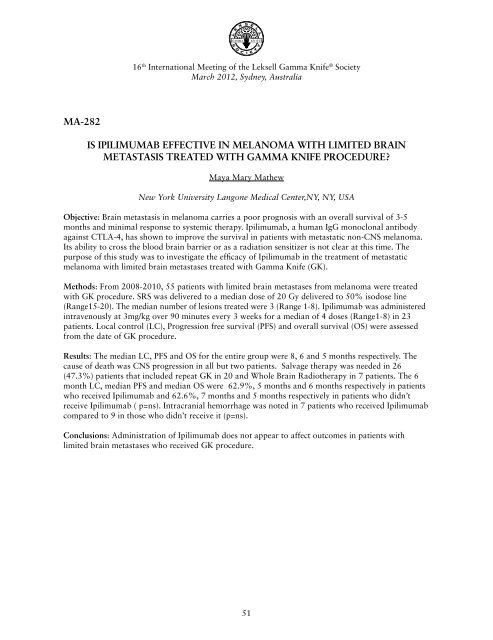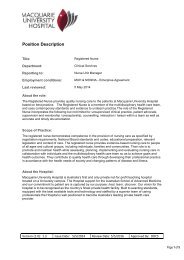Plenary Oral Presentations - Macquarie University Hospital
Plenary Oral Presentations - Macquarie University Hospital
Plenary Oral Presentations - Macquarie University Hospital
Create successful ePaper yourself
Turn your PDF publications into a flip-book with our unique Google optimized e-Paper software.
16 th International Meeting of the Leksell Gamma Knife ® SocietyMarch 2012, Sydney, AustraliaMA-282Is Ipilimumab effective in melanoma with limited brainmetastasis treated with Gamma Knife procedure?Maya Mary MathewNew York <strong>University</strong> Langone Medical Center,NY, NY, USAObjective: Brain metastasis in melanoma carries a poor prognosis with an overall survival of 3-5months and minimal response to systemic therapy. Ipilimumab, a human IgG monoclonal antibodyagainst CTLA-4, has shown to improve the survival in patients with metastatic non-CNS melanoma.Its ability to cross the blood brain barrier or as a radiation sensitizer is not clear at this time. Thepurpose of this study was to investigate the efficacy of Ipilimumab in the treatment of metastaticmelanoma with limited brain metastases treated with Gamma Knife (GK).Methods: From 2008-2010, 55 patients with limited brain metastases from melanoma were treatedwith GK procedure. SRS was delivered to a median dose of 20 Gy delivered to 50% isodose line(Range15-20). The median number of lesions treated were 3 (Range 1-8). Ipilimumab was administeredintravenously at 3mg/kg over 90 minutes every 3 weeks for a median of 4 doses (Range1-8) in 23patients. Local control (LC), Progression free survival (PFS) and overall survival (OS) were assessedfrom the date of GK procedure.Results: The median LC, PFS and OS for the entire group were 8, 6 and 5 months respectively. Thecause of death was CNS progression in all but two patients. Salvage therapy was needed in 26(47.3%) patients that included repeat GK in 20 and Whole Brain Radiotherapy in 7 patients. The 6month LC, median PFS and median OS were 62.9%, 5 months and 6 months respectively in patientswho received Ipilimumab and 62.6%, 7 months and 5 months respectively in patients who didn’treceive Ipilimumab ( p=ns). Intracranial hemorrhage was noted in 7 patients who received Ipilimumabcompared to 9 in those who didn’t receive it (p=ns).Conclusions: Administration of Ipilimumab does not appear to affect outcomes in patients withlimited brain metastases who received GK procedure.51
















